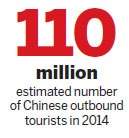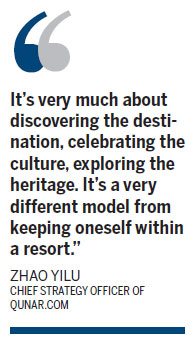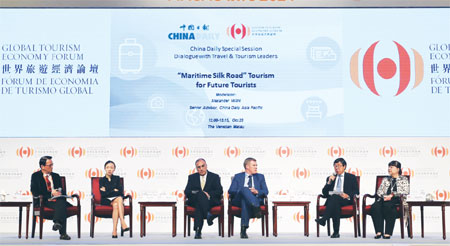China's tourism growth: Celebrating a culture
Updated: 2014-10-29 07:07
By Emma Dai in Macao(HK Edition)
|
|||||||||

A new generation of Chinese tourists will fuel growth along the Maritime Silk Road (MSR), global tourism industry leaders said on Tuesday.
The development of the tourism industry along the Maritime Silk Road, a China-initiated economic belt linking the country with ASEAN and APEC member states, should focus on deeper understanding and demonstration of various cultures in the region and provide better services as well as facilities to cater to the rising number of tourists and boost the business, a group of international industrial leaders said at a China Daily Asia Leadership Roundtable in Macao.
The roundtable session is part of the Global Tourism Economy Forum, an annual event co-organized by the China Chamber of Tourism, the Global Tourism Economy Research Centre and the World Tourism Organization.
"The MSR is to connect a lot of the emerging markets and serve as a catalyst that will repair tourism in a huge way," said Abid Butt, chief executive officer of Banyan Tree Hotels and Resorts. "It will link and open up markets that are not well known and might not be on top of the list for some of the travelers as the next destination."
"Ten years ago, if the global travelers were from the US and Europe, today they are from pan-Asian countries. China plays a big part of it and is definitely the leader," Butt said.

"China's outbound tourism is growing swiftly," said Wang Ping, chairman of the China Chamber of Tourism. "Last year, a total of 100 million Chinese went out of the country, far beyond our expectation of 70 million. In 2014, we estimate the number of Chinese outbound tourists to reach 110 million. Literally, there is now one Chinese among every 10 global travelers."
"The area that grows the fastest in China's outbound tourism is self-guided travel," said Zhao Yilu, chief strategy officer of qunar.com, a mainland online traveling platform with the largest user base in the country. "It's very much about discovering the destination, celebrating the culture, exploring the heritage. It's a very different model from keeping oneself within a resort."
"Judging from what kinds of goods they buy and the behavior they've exhibited, this generation of Chinese tourists is far more independent and better educated in terms of what exactly they want to achieve," said David Baxby, president and chief executive officer of Global Blue.
"In order to connect the markets and drive tourism into their economies, governments need to simplify the visit process - make it easier and cheaper. If you look at what Europe has brought to the Schengen area and what the UK has done more recently, it has been the single most important driver to the growth of Chinese tourists to Europe in the past decade," Baxby said.
"I believe ASEAN countries should work in the direction to adopt an EU visa approach so that we can move around with only one visa. We can work together rather than competing against each other," said Edmond Ip, vice-chairman of Artyzen Hospitality Group.
"Future tourists are keen to see and explore new culture, experience and they are willing to pay for it. They go for variety," he said.
"To cater to that, governments should cooperate with each other. Simplifying visa applications, especially for Chinese, is an issue. And we need to have a more efficient immigration process. Tourism attraction and infrastructure is another area to spend on. We need to provide better public transportation, a variety of cultural and art centers, dining choices and annual events like what Singapore and Dubai do, which can drive people back again and again," Ip added.
emmadai@chinadailyhk.com
|
Edmond Ip (second right), vice-chairman of Artyzen Hospitality Group, shares his views with tourism and travel industry leaders at a China Daily Asia Leadership Roundtable in Macao on Tuesday. A common travel visa policy among ASEAN member states is expected to give a big lift to the region's tourism industry. Parker Zheng / China Daily |
(HK Edition 10/29/2014 page9)
